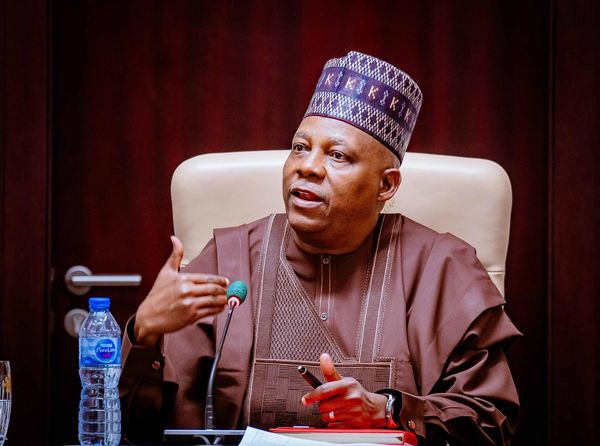How CBN, NSA Save Nigeria From Economic Sabotage – Shettima
By People’s Voice Nigeria | News
Nigeria’s Vice President, Kashim Shettima on Thursday said the interventions of the Central Bank of Nigeria (CBN) and the National Security Adviser (NSA) in the foreign exchange (FX) market have “translated into desired results”.
Shettima made this known while speaking at the 2nd chronicle roundtable in Abuja, organised by the 21st Century Media Services, publishers of the 21st Century Chronicles, as part of its public service enlightenment series.
New Telegraph recalls that on February 24, the CBN and the Office of the National Security Adviser (ONSA) sealed a partnership to investigate and penalise those involved in illicit activities within the foreign exchange (FX) market.
The decision was against the backdrop of the unending depreciation of the naira and its accompanying negative impact on inflation and economic instability.
Speaking on the development, the Vice-President said Nigeria has been facing economic sabotage for long, prompting the CBN Governor, Yemi Cardoso, and Nuhu Ribadu, the National Security Adviser, to take action against those plotting to frustrate the country’s reforms.
This action, according to the former governor of Borno State, has led to the desired outcomes.
“For long, Nigeria had endured economic sabotage, leading to the resolve by Governor of the central bank, Mr. Yemi Cardoso, and the National Security Adviser, Malam Nuhu Ribadu, to take matters into their hands to neutralise the overpowering influence of currency manipulators who had conspired to frustrate our reforms,” Shettima said.
“Today, I stand proud to say that their interventions have translated into desired results, and Naira’s pushback against all odds is an inspiring journey that doesn’t have to be learned in Buenos Aires, as some would want us to do.”
Shettima urged Nigerians to be patient with the administration of President Bola Tinubu “as he steers the ship of state through the economic turbulence and storm he met on ground on assumption of office”.
He said, the administration is eager for a positive impact on the economy from various new initiatives in sectors such as oil and gas, creative arts, steel and solid minerals, housing, blue economy, and digital sectors.
“There is no doubt that there’s a time to plant and a time to reap,” the vice-president said.
“In between those times, we appeal for patience and seek collective sacrifice from all, especially from us. We wish there were a way to treat this ailment without surgery.
“Soon, Nigeria’s economy will experience significant growth once we’ve overcome these sacrifices.
“Positive changes will soon be evident across all economic indicators – inflation, per capita income, GDP numbers, poverty reduction, food security, and all aspects close to the hearts of our people.”
In his opening remarks, Shamsudeen Usman, chairman of the Ministry of Finance Incorporated (MOFI), commended the content of the renewed hope agenda of the incumbent government, describing it as one of the most detailed and carefully crafted policy documents in the history of the country.
The former finance minister stressed the need for the document to be reviewed and integrated into the medium and long-term development framework of the country.
He noted that policy consistency, with a long-term vision to transform critical sectors of the economy, is the way to go.
Usman also commended the administration’s establishment of a central coordination delivery unit to track the performance of programmes, policies and key interventions of the government.
According to the MOFI boss, monitoring key performance indicators in the policy document is critical to the success of the government.
On his part, Mahmud Jega, CEO of 2nd Chronicle Newspaper, said the need to critically analyse government policies and programmes is not just an expectation from the media but indeed borne out of the necessity to collectively contribute to shaping the nation’s development trajectory.
